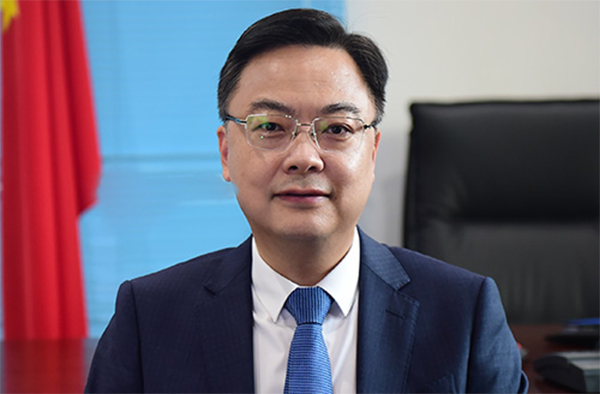07/08/2024
07/08/2024
The Third Plenary Session of the 20th Central Committee of the Communist Party of China (CPC), which was recently held in Beijing, has garnered global attention. This session was centered on advancing modernization with a Chinese approach and launching strategic initiatives to deepen reforms comprehensively. Its implications are significant for China’s future development and offer new possibilities for the world.

I would like to briefly explain this to our friends in Kuwait using two key terms. The first key term is “opening up”. Chinese President Xi Jinping said, “Opening up is a driving force and an important force for the progress of human civilization and the only way for the world to prosper and develop.” At present, anti-globalization, protectionism, and unilateralism trends are on the rise, and the momentum of global economic recovery is insufficient. This requires all countries to adhere to the spirit of cooperation and openness to jointly maintain the global economic order and the security and stability of industrial chains of supply.
The opening-up policy is a distinctive feature of China’s modernization. In recent years, China has significantly and more widely opened its door to the outside world. This includes establishing 22 pilot free trade zones, building the Hainan Free Trade Port, and pushing for the signing and operation of the Regional Comprehensive Economic Partnership (RCEP). China has also been reducing restrictions on foreign investment, easing entry barriers in service sectors such as telecommunications and healthcare, and actively promoting high-quality joint construction of the “Belt and Road” initiative.
Additionally, China has built international economic and trade platforms like the China International Import Expo, the China International Fair for Trade in Services, and the China International Consumer Goods Expo. China’s commitment to openness has contributed over 30 percent to global economic growth, positioning it as a key driver of world prosperity.
The session highlighted that China will continue to uphold its policy of opening up, persist in driving reform through this openness, and enhance its capacity to expand international cooperation based on China’s huge market advantage. This approach aims to build a new, higher-level open economic system.
During the session, comprehensive plans were prepared to enhance the system and mechanisms for high-level opening-up across five areas:
? Expanding institutional opening up with concrete steps,
? Deepening reforms in the foreign trade system,
? Improving the management of foreign and outbound investment systems,
? Optimizing regional opening-up strategies,
? Advancing the high-quality joint construction of the “Belt and Road” initiative.
This approach signals China’s commitment to expanding its high-level opening up and offering new opportunities for global economic recovery and stable development. The second key term is “peaceful development.” Chinese President Xi Jinping described the path of peaceful development as China’s response to international concerns about its growth and a reflection of the Chinese people’s confidence and determination to achieve progress.
Confidence
This confidence and awareness stem from the deep roots of Chinese civilization, the Chinese people’s understanding of their country’s conditions and development goals, and their insight into global trends. Peaceful development is an inevitable choice for China’s modernization. As an old Chinese proverb states - “A country that advocates war is doomed, even if it is strong.” Unlike some Western countries that achieved modernization through war and colonialism, China is pursuing modernization with distinctive Chinese characteristics under the leadership of the Communist Party of China, through serious exploration and a commitment to peace, cooperation, and development. In an era of global interdependence, China advocates for a concept of common, comprehensive, cooperative, and sustainable security, viewing the world as a stage for shared development rather than a battleground for competition.
In the Middle East, China does not seek selfish interests, engage in geopolitical rivalries, or divide spheres of influence. Instead, China maintains a spirit of equal and friendly partnership, respects the sovereign choices of countries in the region, and is prepared to contribute to regional peace through sincere cooperation. It is worth noting that China’s mediation has succeeded in achieving historic reconciliation between Saudi Arabia and Iran. It recently facilitated the signing of the “Beijing Declaration on Ending Division and Strengthening Palestinian National Unity” by 14 Palestinian factions, thus infusing new positive energy into efforts for security and stability in the Middle East.
Peace
During the session, it was affirmed that China will steadfastly and consistently pursue an independent foreign policy of peace, promote the building of a community with a shared future for mankind, and uphold the common values of humanity. China will also implement the Global Development Initiative, the Global Security Initiative, and the Global Civilization Initiative, as well as advocate for global multipolarity characterized by equality and order, and promote economic globalization that is inclusive and beneficial to all. China aims to lead the reform and development of the global governance system while firmly safeguarding its sovereignty, security, and development interests.
Chinese-style modernization is committed to the path of peaceful development and will contribute positively to global peace and development. China’s comprehensive reforms and Chinese-style modernization will positively impact China-Kuwait relations. Under the wise leadership of both countries’ leaders, bilateral relations have entered a new phase.
There is significant potential for both countries to expand mutual openness and deepen practical cooperation, as they share common goals of peaceful development and enhancing regional security and stability. China is eager to work with Kuwait to implement the important consensus reached by their leaders, align development strategies, push for mutually beneficial cooperation across various fields, and strengthen communication and coordination in international and regional matters. Together, they aim to solidify the bilateral strategic partnership, promote the well-being of both peoples, and contribute to peace, stability, and development in the Middle East.
By H.E. Zhang Jianwei
Ambassador of the People’s
Republic of China to the State of
Kuwait


